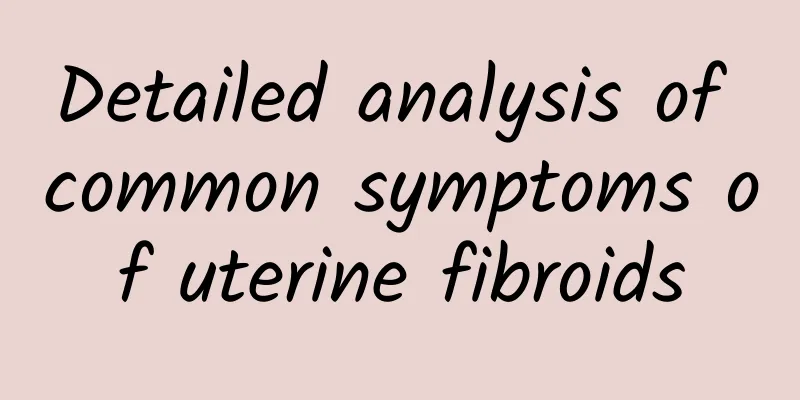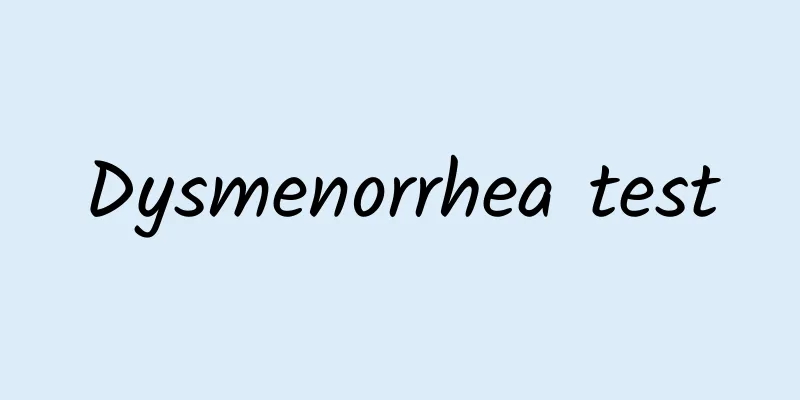Detailed analysis of common symptoms of uterine fibroids

|
Uterine fibroids are benign tumors that occur in the smooth muscle tissue of the uterus. If the fibroids grow rapidly in a short period of time or if the fibroids of postmenopausal women tend to grow, there is a risk that the fibroids will become cancerous. Therefore, it is very important to detect the symptoms of uterine fibroids in time and treat them as soon as possible. Below we invite experts to analyze the symptoms of uterine fibroids in detail. Common symptoms of uterine fibroids include: 1. Menstrual changes : The most common symptom of uterine fibroids, manifested as shortened menstrual cycle, increased menstrual flow, prolonged menstrual period, irregular vaginal bleeding, etc. 2. Increased leucorrhea : Increased leucorrhea, sometimes with a large amount of purulent and bloody discharge and necrotic tissue discharge with a foul odor. 3. Abdominal mass : Abdominal mass is also a common symptom of uterine fibroids. The abdomen is swollen, and a mass can be felt in the lower abdomen, accompanied by a feeling of falling. Generally, patients do not have abdominal pain, but often have lower abdominal distension, back pain, etc. When the pedicle of the subserosal fibroid is twisted, acute abdominal pain may occur. When the fibroid turns red, the abdominal pain is severe and accompanied by fever. 4. Compression symptoms : When the fibroid grows forward or backward, it can compress the bladder, urethra or rectum, causing frequent urination, dysuria, urinary retention or constipation. When the fibroid grows to both sides, it forms a broad ligament fibroid, which compresses the ureter and can cause hydroureteral or renal pelvis; if it compresses the pelvic blood vessels and lymphatic vessels, it can cause lower limb edema. 5. Secondary anemia : If the patient has excessive menstruation for a long time, it may lead to secondary anemia, with symptoms such as general fatigue, pale complexion, shortness of breath, and palpitations. 6. Infertility or miscarriage : Patients with uterine fibroids have the fibroid tissue in the uterine cornu compressing the entrance of the fallopian tube, causing the uterus to deform and hindering the implantation of the fertilized egg, ultimately leading to infertility. The above is the expert’s introduction to the symptoms of uterine fibroids. If you find the above symptoms, please seek timely treatment to avoid worsening of the condition and causing greater difficulties for future treatment. For more information, please visit the uterine fibroid disease special topic at http://www..com.cn/fuke/zgjl/ or consult an expert for free. The expert will then give a detailed answer based on the patient's specific situation. |
<<: Detailed explanation of the symptoms of vaginitis
>>: Key points for diagnosis of uterine fibroids
Recommend
Three effective treatments for cervical hypertrophy
The disease of cervical hypertrophy needs early t...
Is cervical erosion 2 serious? What are the dangers?
Cervical erosion usually refers to cervical colum...
What are the early symptoms of gynecological diseases such as adnexitis?
In recent years, the incidence of adnexitis has b...
What are the symptoms of premature ovarian failure?
What are the symptoms of premature ovarian failur...
The main causes of pelvic inflammatory disease
Pelvic inflammatory disease is a common gynecolog...
What are the causes of ectopic pregnancy?
Ectopic pregnancy is a common gynecological disea...
Experts explain the precautions for treating Trichomonas vaginitis
Trichomonas vaginitis is a very harmful gynecolog...
It is important to know the early symptoms of cervical hypertrophy
There are various female diseases in life, and ce...
How to treat adnexal cysts after menopause
How to treat adnexal cysts after menopause? There...
These diseases are also the cause of cervical hypertrophy
The cause of cervical hypertrophy is a topic of g...
Is the third degree cervical erosion serious for women? The third degree cervical erosion has serious hazards.
Among the common gynecological diseases in women,...
How are uterine fibroids induced? What are the methods to prevent uterine fibroids?
What causes uterine fibroids? Uterine fibroids ar...
Are you still eating lots of fish and meat for the New Year dinner? Nutritionist reveals: Six tips for New Year's Eve dinner, delicious and balanced without excess
The Lunar New Year is approaching, and every hous...
What is the cause of vaginitis? What complications does bacterial vaginitis cause?
What is the cause of vaginitis? What complication...
What is threatened miscarriage?
Some women in early pregnancy go to the hospital ...









